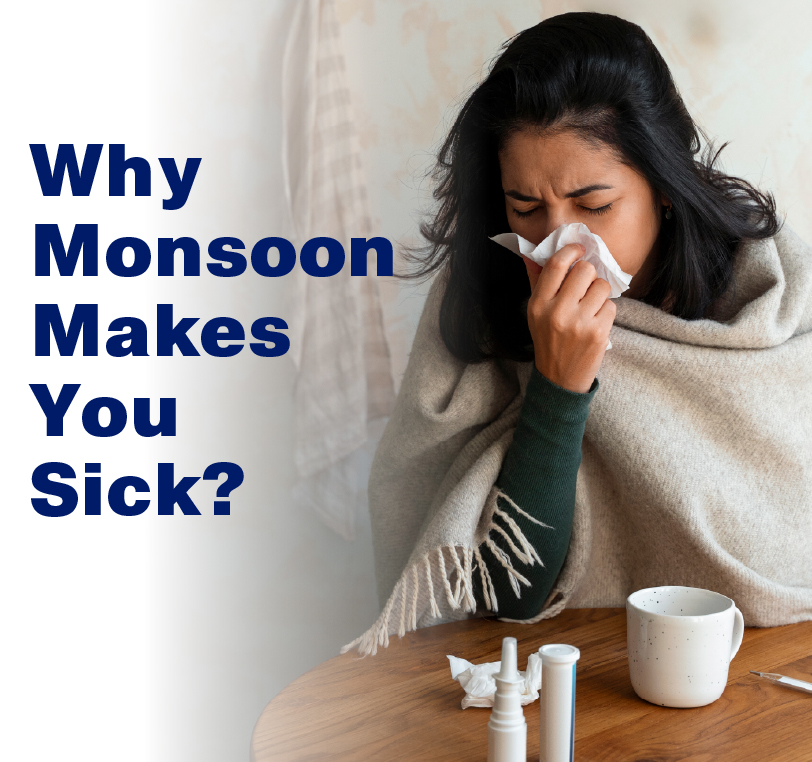Why Monsoon Makes You Sick: Common Illnesses and Prevention Tips
Why the Monsoon Season Makes You Sick And What You Can Do About It
As the first drops of monsoon rain bring relief from the summer heat, many of us eagerly welcome the cooler air and lush greenery. But along with the refreshing change, the monsoon season also ushers in a spike in illnesses, from fever and stomach upsets to skin infections and respiratory troubles. If you wonder why this happens every year, you’re not alone. It’s no coincidence; the monsoon environment creates the perfect storm for many common infections.
What Makes the Monsoon Season a Trigger for Illness?
First, the rising humidity and stagnant water left behind by the rains create ideal breeding grounds for mosquitoes. Those tiny pests carry diseases like dengue, malaria, and chikungunya, and seasonal outbreaks are often linked directly to mosquito numbers.
At the same time, dampness encourages bacteria and fungi to multiply, whether on the skin, clothes, or even food. The sudden shifts from hot, sticky outdoor air to air-conditioned rooms also take a toll on your immune system. Your body constantly adapts to changing temperatures, which can weaken its natural defenses.
Another important factor is less exposure to sunlight during prolonged cloudy days. This can lower your vitamin D levels, a crucial nutrient that plays a key role in immune health.
What Happens to Your Immunity?
Monsoon conditions can throw your immune system off balance in various ways:
· Your gut bacteria—important to overall immunity—may be disturbed when you eat unhygienic street food or improperly stored meals.
· Mould and dampness can worsen respiratory problems, especially in people with asthma or sensitive lungs.
· Wearing wet clothes for too long affects your skin’s natural barrier, making it easier for fungal and bacterial infections to take hold.
All these factors combine to make your body more vulnerable during this rainy season.
How to Protect Yourself This Monsoon
You cannot control the weather, but you can take steps to keep yourself healthy. Here are some simple yet effective tips:
· Choose fresh, warm meals. Avoid raw salads or street food, as they spoil quickly in humidity.
· Drink purified or boiled water. Waterborne illnesses are common in the monsoon.
· Add probiotics like curd or buttermilk to your diet to keep your gut healthy.
· Get enough rest. Aim for 7–8 hours of sleep to keep your immune system strong.
· Spend time in the sun when possible to boost vitamin D levels.
· Change wet clothes promptly and keep your skin dry, especially between folds.
· Wash your hands often with handwash or soap.
· Keep your surroundings clean and remove any stagnant water near your home.
The Usual Culprits: Common Monsoon Illnesses
Here’s what to watch out for in the months when the rains pour down:
Mosquito-borne diseases
Diseases like dengue, malaria, and chikungunya are increasing due to more mosquitoes. Look for high fever, severe fatigue, muscle or joint pain, and rashes.
Water- and food-borne infections
Typhoid, cholera, hepatitis A, and other infections spread through contaminated water or food. Expect vomiting, diarrhea, stomach pain, and sometimes jaundice (yellowing of the skin).
Respiratory infections
Colds, bronchitis, and pneumonia spike as damp conditions and poor ventilation let viruses and bacteria thrive, especially affecting children and elderly people.
Fungal and skin infections
The wet environment encourages fungal infections like athlete’s foot and ringworm. Urinary tract infections (UTIs) also increase, often because of moisture retained in wet clothes and dehydration and using unclean or unhygienic washrooms.
Recommended Tests for Monsoon-Born Diseases
If symptoms linger beyond two days or worsen, it’s time to consult a healthcare professional. Early diagnosis can speed up recovery and reduce complications.
Common tests during monsoon illness check for:
· Dengue (NS1 antigen test)
· Typhoid (Typhi dot, Widal test)
· Liver function (liver function test)
· Blood infections (Complete Blood Count)
· Urinary tract infection (urine culture)
· Skin fungal infections (KOH mount)
Your Monsoon Health Summary
Monsoon doesn’t have to be a season of sickness. By understanding why your body is more vulnerable during this time and taking preventive steps, you can enjoy the rains without worry. Stay mindful of early symptoms, maintain cleanliness, eat right, and don’t hesitate to seek medical advice when needed. With a little care and attention, the beauty of the monsoon can be yours to enjoy, healthy and happy.
If you want, I can help polish this further or add personal anecdotes, quizzes, or other blog elements to enhance engagement. Would you prefer a more casual or a slightly formal tone? Let me know!
